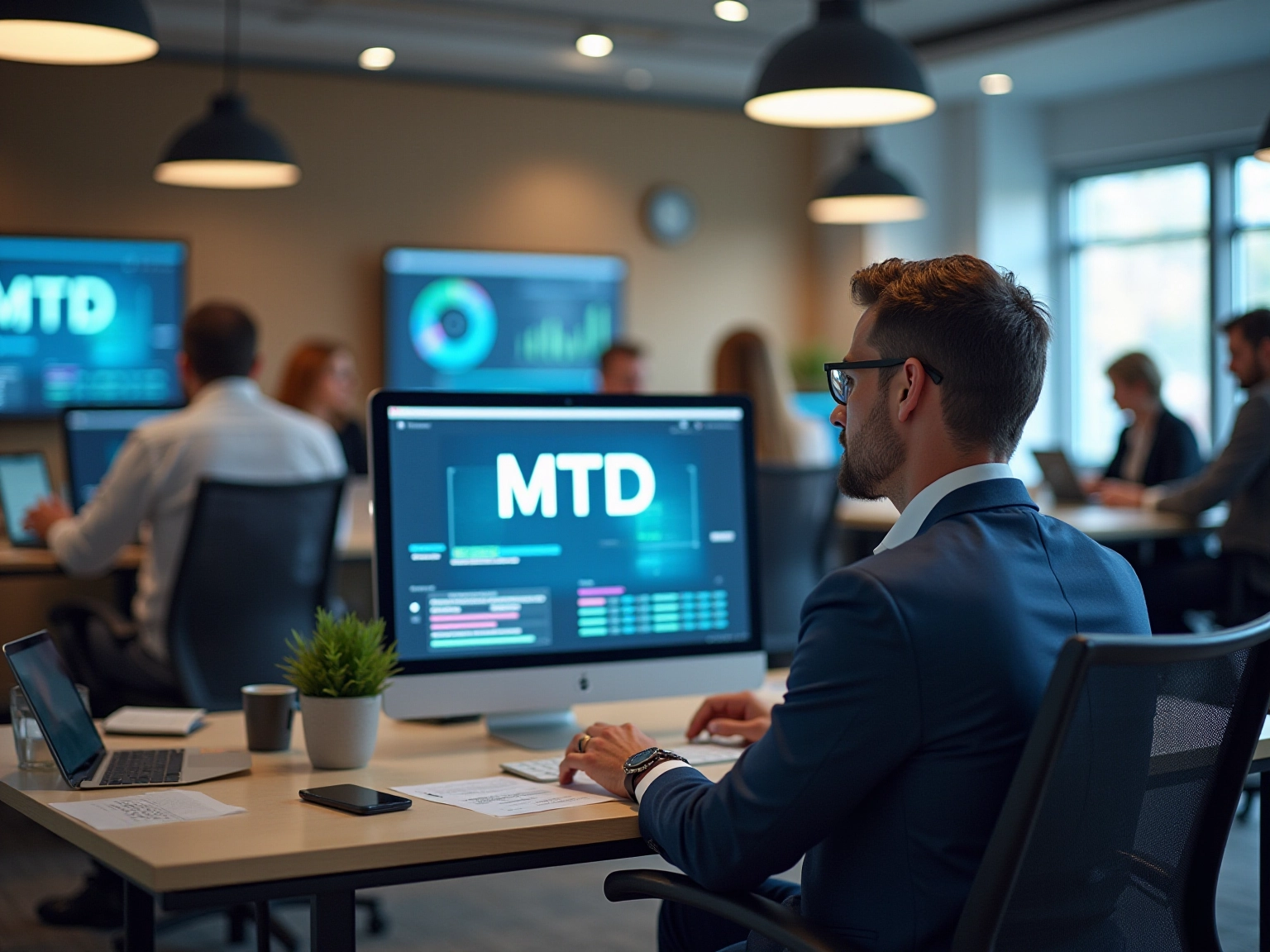Overview
Making Tax Digital (MTD) represents a pivotal UK government initiative focused on modernising tax administration. By mandating digital record-keeping and electronic submissions, MTD initially targeted VAT in 2019, with plans to extend its reach to income tax by 2026. This initiative not only enhances accuracy and efficiency in tax reporting but also imposes significant challenges for accountants.
- They must adapt to new software requirements
- Proactively engaging with clients to ensure compliance
The evolution of tax reporting through MTD underscores the necessity for accountants to embrace these changes, positioning themselves as trusted advisors in a digital landscape.
Key Highlights:
- Making Tax Digital (MTD) is a UK government initiative requiring digital record-keeping and electronic tax submissions to enhance accuracy and streamline tax administration.
- MTD began with VAT in 2019 and will expand to include income tax by 2026, necessitating quarterly updates for individuals and businesses with annual income over £50,000.
- Accountants face challenges in adapting to MTD, emphasizing the need for proactive engagement and the use of compatible software to ensure compliance.
- Tools like Glasscubes streamline communication and information gathering, significantly reducing response times and enhancing client engagement.
- The initiative aims to improve tax compliance rates, with businesses reporting time savings and increased efficiency through digital solutions.
- Financial professionals must stay informed about MTD requirements, utilize cloud-based accounting software, and provide training to clients for effective compliance.
- Common misconceptions about MTD include the belief that it requires monthly submissions and is primarily aimed at increasing tax revenue; the reality is quarterly submissions focused on accuracy.
- Emerging technologies such as AI and machine learning are expected to further revolutionize tax compliance, with significant time and cost savings reported by businesses using MTD software.
Introduction
In an era defined by rapid technological advancements, the UK tax system is experiencing a profound transformation through the Making Tax Digital (MTD) initiative. This ambitious government programme mandates that businesses and individuals maintain digital records and submit tax returns electronically, with the objective of enhancing accuracy and streamlining tax administration.
As MTD expands to include income tax and other tax types by 2026, accountants are confronted with the challenge of adapting to new compliance requirements while harnessing technology to elevate client engagement.
Insights from industry experts and real-world case studies illuminate the implications of MTD for the accounting profession, exploring the tools and strategies that can facilitate a smoother transition and drive efficiency in tax reporting.
Understanding Making Tax Digital: An Overview
Making tax digital is a transformative government initiative aimed at modernising the UK tax system by mandating that businesses and individuals maintain digital records and submit tax returns electronically. Launched by HMRC, making tax digital (MTD) is designed to enhance tax reporting accuracy, minimise errors, and streamline the overall tax administration process. The initiative began its gradual implementation with VAT in 2019 and is poised to broaden to encompass income levies and other charges by 2026.
This progressive shift towards making tax digital aims to simplify tax compliance for both taxpayers and HMRC. Current statistics indicate that just under half of individuals filing taxes are comfortable interacting with HMRC without the assistance of an agent, highlighting a growing trend towards self-service in tax matters. However, the transition to making tax digital (MTD) presents challenges for the accounting profession. HMRC statistics reveal a significant reliance on third-party software for filing self-assessment tax returns. This reliance emphasises the importance for accountants to adjust to MTD requirements proactively, motivating customers to engage in continuous tax management rather than postponing compliance until the last moment.
Expert opinions reflect a consensus on the advantages of MTD. Dean Shepherd, director of customer education and engagement at TaxCalc, notes a decline in the use of HMRC’s website, citing its slow and cumbersome nature compared to more efficient third-party software solutions. This sentiment is echoed by users in the field, such as Sophie Montgomery from TaxAssist Accountants, who reported an impressive 288 hours saved in just one tax season through streamlined digital processes.
This underscores the considerable time savings that can be realised through efficient digital interaction, which is vital as companies prepare for making tax digital.
Moreover, dedicated onboarding support is crucial for accounting firms to enhance their customer information collection and engagement, enabling a smoother transition to making tax digital. Glasscubes exemplifies this by providing automated communication and information gathering tools that improve customer engagement. As one audit manager observed, the platform facilitates smooth requests for information, allowing users to upload documents more swiftly than conventional email methods.
The automated reminders feature ensures that users are prompted to provide necessary documents, while the real-time tracking capabilities empower users to monitor their outstanding obligations independently. This transparency not only benefits the audit team but also enables customers to keep track of their responsibilities.
As the accounting profession prepares for the mandatory adoption of making tax digital, the impact on tax compliance rates is expected to be significant. Companies that embrace this digital transformation, utilising tools like Glasscubes, are likely to experience enhanced efficiency and customer engagement, ultimately resulting in better compliance outcomes. The latest updates from HMRC suggest that the shift to making tax digital (MTD IT) will be challenging, requiring a unified effort from financial professionals to assist their customers in navigating this evolving landscape.
By adopting proactive strategies and leveraging technology, accounting firms can not only meet compliance requirements but also elevate their overall service delivery.

Key Requirements and Deadlines for MTD Compliance
Under the Making Tax Digital initiative, businesses and individuals whose annual income exceeds £50,000 will be required to keep digital records and provide quarterly updates to HMRC, beginning in April 2026. This phased implementation will see different groups facing varying deadlines, allowing some taxpayers the option to voluntarily enrol earlier. Accountants must notify their customers about these upcoming deadlines and the critical importance of using compatible software to ensure adherence to MTD requirements.
Non-compliance can lead to significant penalties, including fines and increased scrutiny from HMRC, underscoring the necessity of proactive engagement in this transition.
As firms adapt to making tax digital, many are leveraging tools like Glasscubes to streamline their processes. A case study titled “Streamlining Communication in Accounting Firms” emphasises how Glasscubes aids in the efficient collection of customer information, including personal tax and payroll data. By utilising features such as automated reminders and real-time reporting, accounting teams can greatly minimise the time spent pursuing customers for information, achieving a remarkable 50% decrease in response times.
This optimisation of workflows enhances client satisfaction, establishing Glasscubes as an invaluable tool for making tax digital during the transition.
With the introduction of making tax digital (MTD), it is essential for financial professionals to stay informed about the key requirements for compliance in 2025 and beyond. This includes understanding the specific software capabilities needed to meet making tax digital standards and the implications of failing to comply. As the deadline nears, financial professionals must also consider the existing penalties for non-compliance, which may involve fines and heightened scrutiny from HMRC.
Furthermore, HMRC offers a complimentary MTD toolkit and online resources for small enterprises, along with a specialised helpline, which can support financial professionals and their customers in adjusting to making tax digital. As Sean McGinness, National Tax Partner and Head of VAT at Saffery, advises, understanding VAT processes and controls is crucial, and leveraging technology like Glasscubes can significantly aid in achieving compliance. Therefore, it is imperative for financial professionals to act swiftly and efficiently.
MTD’s Impact on Various Tax Types: VAT, Income Tax, and More
Making Tax Digital (MTD) initially targeted VAT by mandating that all VAT-registered businesses maintain digital records and submit their VAT returns using compatible software. As MTD evolves to encompass income tax, self-employed individuals and landlords will encounter similar compliance requirements. This shift necessitates that taxpayers maintain precise digital records of their income and expenses, along with submitting quarterly updates to HMRC.
The anticipated benefits of MTD include enhanced transparency and a reduction in the tax gap, as timely and accurate reporting becomes the norm. Recent statistics indicate that approximately 831,895 businesses were required to sign up for MTD as of August 2022, underscoring the scale of this initiative and its implications for compliance within the accounting profession.
Success stories from businesses that have transitioned to MTD reveal significant improvements in compliance rates. For instance, a survey examining the consequences of inaccurate VAT filings found that nearly 24% of businesses faced audits due to inaccuracies, while 20% admitted to overpaying VAT. These findings underscore the critical importance of meticulous record-keeping in avoiding compliance failures.
As accounting firms prepare for the challenges linked to MTD for Income Tax Self Assessment (ITSA), tools like Glasscubes can play a crucial role in enhancing engagement with customers. Glasscubes improves communication through automated reminders and real-time progress tracking, ensuring that all correspondence related to audits is organised and easily accessible. This not only streamlines information requests but also provides accountants with a clear view of outstanding queries, reducing the time spent searching for information.
Unlike traditional email communication, which can lead to misplaced responses and visibility issues, Glasscubes ensures that all correspondence is contained within each audit request, promoting a more efficient workflow.
Expert opinions suggest that while the initial implementation of MTD for VAT has had minimal impact, the upcoming challenges for ITSA are expected to be more pronounced. As the deadline approaches, tax professionals are preparing for an increased workload, emphasising the need for effective digital record-keeping solutions. An unnamed respondent remarked, “Although tight and there would be a considerable amount of work required from agents, a substantial amount of time had been invested by agents preparing for this deadline and communicating with customers.”
Furthermore, the impact of MTD on compliance rates is evident, with many tax experts advocating for the benefits of digital record-keeping. They argue that adopting these practises not only streamlines the reporting process but also enhances overall efficiency for self-employed individuals and landlords. With dedicated onboarding assistance, accounting firms can significantly improve their information gathering and engagement, ensuring a smoother transition to MTD.
Additionally, Glasscubes is secure, encrypted, and GDPR compliant, providing peace of mind for firms concerned about data security. As MTD continues to transform the landscape of tax compliance, its implications for the accounting profession and their clients will be profound, making the utilisation of tools like Glasscubes essential for success.
Navigating Technology: Software Solutions for MTD Compliance
To comply with making tax digital, financial professionals and their customers must utilise software that meets HMRC’s stringent requirements. This necessitates the adoption of cloud-based accounting solutions that facilitate real-time data entry and automated reporting, ensuring accuracy and efficiency in tax management. Among the most popular options for making tax digital are Xero, QuickBooks, and Sage, each offering tailored features designed specifically for compliance.
For instance, Sage offers its Accounting Start plan at £15 (+ VAT) per month, making it an accessible option for many firms. Xero simplifies accounting for small businesses by emphasising automation and collaboration, connecting seamlessly with various third-party applications to enhance financial management. This integration enables financial professionals to optimise workflows and enhance customer interactions, making it a valuable tool for making tax digital. However, it is essential to note that while software can significantly aid in compliance, financial professionals play a crucial role in guiding those they serve through the selection of appropriate software.
They should not only suggest solutions but also offer thorough training to ensure users can effectively utilise these tools for maintaining precise records and submitting timely tax returns. This assistance is essential, as the appropriate software can greatly lessen the time dedicated to compliance tasks.
Statistics show a rising trend among UK financial professionals towards cloud-based solutions, with numerous firms noting enhanced efficiency and better customer response rates. For instance, companies using Glasscubes have seen a 40% rise in customer response rates and a 50% decrease in response times. The platform’s automated reminder feature allows accountants to send an unlimited number of reminders, customised to indicate urgency for upcoming deadlines.
This feature operates by allowing users to establish reminders on a straightforward timetable or tailor them for particular days, improving communication with customers. Furthermore, users such as Sophie Montgomery from TaxAssist Accountants have indicated an impressive 288 hours saved in a single tax season, highlighting the effect of effective software on customer engagement.
In conclusion, selecting the appropriate accounting software that facilitates making tax digital is crucial for compliance and efficiency. Accountants should consider factors such as user-friendliness, integration capabilities, and the particular requirements of those they serve when making recommendations. By utilising the finest software solutions available, especially Glasscubes, which provides adaptable subscription options including a 30-day free trial, practitioners can improve their practise and ensure their customers remain compliant with making tax digital.
Pros and Cons of Making Tax Digital: A Balanced Perspective
The execution of making tax digital (MTD) presents significant advantages for financial professionals and their clients. Among these benefits is the enhanced accuracy in tax reporting, which minimises errors and bolsters compliance. Additionally, MTD reduces administrative burdens by automating data entry and streamlining processes, allowing financial professionals to focus on strategic advisory roles.
Another crucial benefit is the improved transparency of financial information. Both financial professionals and clients can access real-time data, fostering informed decision-making.
Nevertheless, the transition to MTD is not without challenges. Accountants must adopt compatible software, which can entail considerable costs and necessitate meticulous planning. Furthermore, clients may encounter a steep learning curve as they adapt to new digital systems, requiring additional support from their accountants.
This support is vital, especially as firms that have embraced MTD report mixed experiences. While some have experienced increased efficiency, others have struggled with initial setup and ongoing compliance requirements. Expert insights underscore the importance of proactive communication during this transition. Accountants must effectively guide clients through MTD compliance, assisting them in navigating the complexities of the new system. For instance, companies utilising tools such as Glasscubes have reported a 50% reduction in customer response times, demonstrating how technology can alleviate some pressures associated with MTD compliance.
Steve, an audit manager at MGI, noted that Glasscubes has significantly improved their information management, enabling clients to view outstanding queries and upload information more swiftly than through traditional email methods. This transformation in client engagement not only enhances communication but also streamlines the audit process, making it more efficient. Moreover, HM Revenue and Customs has indicated that businesses adopting MTD saved time on ‘business finances and record keeping’ tasks on average, reinforcing the positive outcomes of embracing digital solutions.
Glasscubes also provides specialised onboarding support, essential for helping professionals and their clients manage the transition to MTD more effectively. This support addresses initial concerns regarding user engagement and the usability of the new system. Ultimately, the successful implementation of MTD hinges on financial professionals’ ability to balance these advantages and disadvantages while offering the necessary support to those they serve.

Preparing for MTD: Practical Steps for Accountants
To effectively prepare for making tax digital, financial professionals must undertake several key steps. A thorough assessment of current systems is essential to identify compliance gaps. This proactive approach enables firms to pinpoint areas needing improvement before the MTD deadlines arrive.
Equally important is the interaction with customers; financial professionals should initiate discussions about the upcoming changes and emphasise the significance of maintaining digital records. This conversation not only educates customers but also fosters a cooperative atmosphere for compliance.
Investing in training for both financial professionals and customers on software that meets making tax digital requirements is crucial. This investment ensures that all parties are equipped with the necessary skills to navigate the new digital landscape effectively. Furthermore, creating a clear timeline for making tax digital will assist accountants in managing their workload and ensure that all customers are prepared by the necessary deadlines.
Recent statistics indicate that partnership income is currently not included in the scope of MTD for Income Tax, underscoring the necessity for accountants to stay updated on changing regulations. As Sophie Montgomery from TaxAssist Accountants noted, effective engagement with customers can lead to substantial time savings, reporting an impressive 288 hours saved in just one tax season. This highlights the importance of leveraging technology and fostering transparent dialogue with customers.
In this context, Glasscubes’ automated reminder feature plays a crucial role in enhancing communication with customers. Accountants can send up to 10 reminders on a simple schedule or utilise advanced options to send an unlimited number of reminders with any frequency or on specific days of the year. This guarantees that customers remain consistently informed and engaged throughout the compliance process.
Moreover, the ability to tailor messages for each reminder enables professionals to convey heightened urgency regarding impending deadlines. The seamless onboarding process offered by Glasscubes ensures that no extensive training is necessary, allowing financial professionals to swiftly utilise these tools and focus on customer relationships.
Additionally, Dean Shepherd, director of customer education and engagement at TaxCalc, has expressed concerns about the ineffectiveness of HMRC’s website for tax submissions, advocating for third-party software as a more effective alternative. By implementing these strategies, including dedicated onboarding support and leveraging automated reminders, professionals can enhance customer engagement and streamline the compliance process, ultimately leading to a more efficient transition to making tax digital.

Debunking Myths: Common Misconceptions About MTD
Numerous myths persist regarding making tax digital (MTD), often leading to confusion among financial professionals and their customers. A prevalent misconception is that making tax digital requires businesses to submit tax returns on a monthly basis. In reality, the requirement is for quarterly submissions, which allows businesses to manage their reporting more effectively without overwhelming administrative burdens. Another common myth is the belief that MTD is primarily aimed at increasing government tax revenue.
However, the core objective of making tax digital (MTD) is to enhance the accuracy and efficiency of tax reporting, which helps reduce errors and improve compliance. Indeed, data shows that 88% of spreadsheets have mistakes, emphasising the dangers linked to conventional record-keeping techniques and pointing out the necessity of making tax digital to address these problems.
Accountants play an essential part in dispelling these misconceptions by offering customers clear, factual information about making tax digital. Engaging in proactive communication can help alleviate concerns and misconceptions. For instance, a significant percentage of financial professionals have successfully debunked myths surrounding making tax digital, fostering a better understanding of its implications for businesses.
To effectively counter these misconceptions, they can leverage case studies that illustrate the practical benefits of making tax digital (MTD). For example, firms that have embraced making tax digital have reported improved accuracy in their tax submissions and a reduction in the time spent on compliance-related tasks. Notably, users like Sophie Montgomery from TaxAssist Accountants have reported an impressive 288 hours saved in just one tax season, showcasing the efficiency gains from adopting MTD-compliant practises.
By sharing these insights, financial professionals can strengthen the positive elements of making tax digital and encourage customers to confidently adjust to the new requirements.
Moreover, with deadlines for corporation tax under making tax digital anticipated after 2027, it is essential for financial experts to prepare their customers for these forthcoming changes. The significance of precision in tax submissions is further highlighted by the difficulties encountered in R&D tax claims, where a comprehensive grasp of UK tax legislation is crucial to evade possible audits and penalties.
In summary, tackling and dispelling misconceptions surrounding making tax digital is vital for financial professionals in 2025. By providing accurate information and utilising real-world examples, they can help clients navigate the complexities of making tax digital, ultimately leading to a smoother transition and enhanced compliance.

The Future of Making Tax Digital: What Accountants Need to Know
As making tax digital continues to evolve, it is crucial for financial professionals to remain vigilant regarding upcoming changes in regulations and technology. Anticipated developments may include the expansion of MTD to encompass additional tax types, alongside enhancements to the digital reporting process that streamline compliance. Moreover, stakeholder involvement will persist prior to the introduction of legislation before April 2026, ensuring that financial professionals are aware of the timeline and context of these changes.
The integration of emerging technologies such as artificial intelligence and machine learning is expected to revolutionise tax compliance and reporting, offering unprecedented efficiencies. Statistics indicate that businesses utilising MTD software have reported average time savings ranging from 26 to 40 hours annually, translating to an estimated total of 32 million to 49 million hours saved across all businesses employing this technology. This significant reduction in time spent on compliance tasks underscores the transformative potential of making tax digital and the associated technologies. Additionally, the financial worth of time conserved due to making tax digital has been assessed between £603 million and £915 million, underscoring the significant effect that these advancements can have on the profession.
To navigate these changes effectively, professionals should actively engage with the latest trends and insights in the field. By doing so, they can better prepare their practises and customers for the ongoing transformation of the tax landscape, ensuring they remain competitive and compliant in an increasingly digital environment. Glasscubes improves this engagement through features such as automated reminders, real-time reporting, and streamlined information gathering, enabling financial professionals to manage workflows efficiently.
Glasscubes offers various pricing plans, including the Essential Plan at £120 per month, the Professional Plan at £180 per month, and the Advantage Plan at £360 per month, providing options to suit different needs. As noted by Sophie Montgomery from TaxAssist Accountants, firms have reported impressive time savings due to making tax digital, with one user noting an impressive 288 hours saved in just one tax season, illustrating the real-world benefits of MTD software. With Glasscubes, accountants can leverage these tools to optimise client communication and enhance overall service delivery while ensuring compliance with ISO27001 and GDPR standards.
Conclusion
The Making Tax Digital (MTD) initiative signifies a pivotal transformation in the UK tax landscape, fundamentally altering how businesses and individuals manage their tax obligations. By mandating digital record-keeping and electronic submissions, MTD strives to enhance accuracy, minimise errors, and streamline tax administration. As the initiative broadens to cover various tax types by 2026, accountants encounter both challenges and opportunities in adapting to these new compliance requirements.
Leveraging technology is paramount in this evolving environment. Tools such as Glasscubes and other cloud-based accounting solutions have proven indispensable in facilitating efficient client engagement and improving compliance rates. With features that automate communication and streamline workflows, these technologies not only save time but also empower accountants to concentrate on strategic advisory roles rather than administrative tasks.
Nonetheless, the transition to MTD presents its own set of challenges. Accountants must navigate a steep learning curve, both for themselves and their clients, ensuring they are equipped with the appropriate software and knowledge to meet compliance standards. Proactive communication and dedicated onboarding assistance are vital in guiding clients through this process and dispelling common myths surrounding MTD.
Looking towards the future, MTD promises ongoing advancements in technology and reporting processes. As accountants remain vigilant to forthcoming changes and prepare their practises accordingly, they can harness the benefits of MTD to enhance service delivery and cultivate stronger client relationships. By embracing this digital transformation, the accounting profession can not only fulfil compliance requirements but also thrive in an increasingly digital economy.
